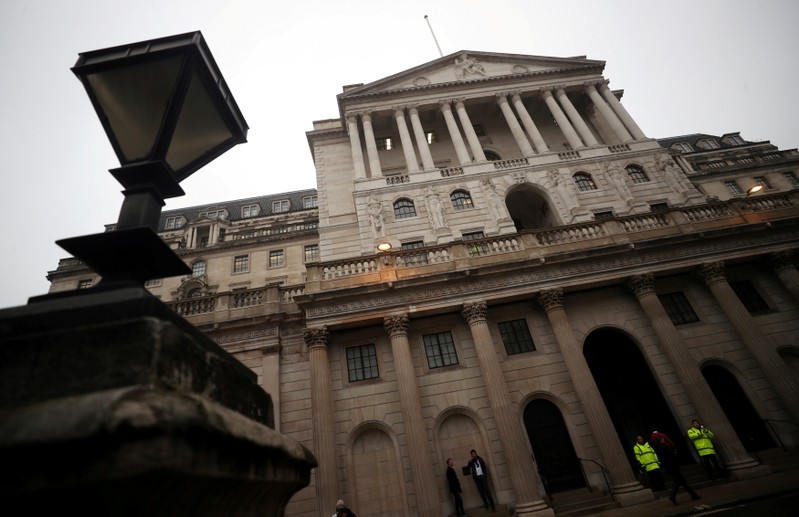
FILE PHOTO: The Bank of England is seen in London, Britain, April 9, 2018. REUTERS/Hannah McKay/File Photo
July 4, 2018
By David Milliken
LONDON (Reuters) – Britain’s large services industry grew last month at its fastest rate since October, a survey showed on Wednesday, suggesting the economy might be strong enough for the Bank of England to raise interest rates next month.
After a weak start to 2018, the IHS Markit/CIPS services Purchasing Managers’ Index (PMI) unexpectedly rose to an eight-month high of 55.1 in June, beating economists’ average forecast in a Reuters poll for it to remain unchanged at 54.0.
Similar surveys this week for the smaller manufacturing and construction sectors also beat expectations.
Taken together, the three PMIs point to overall economic growth of 0.4 percent in the second quarter, double the pace of the first three months of the year, IHS Markit said.
“Stronger growth of service sector activity adds to signs that the economy rebounded in the second quarter and opens the door for an August rate hike, especially when viewed alongside the news that inflationary pressures spiked higher,” IHS Markit economist Chris Williamson said.
Britain’s economy slowed sharply in the first three months of this year, as unusually harsh weather added to an underlying drag from high inflation and still deep uncertainty about Britain’s departure from the European Union in March 2019.
The slowdown caused the BoE to postpone raising rates in May. But the central bank said then that if growth recovered, rates were likely to rise for only the second time in more than a decade as part of a gradual move away from the emergency stimulus program it rolled out during the financial crisis.
Last month BoE chief economist Andy Haldane joined two other members of the BoE’s nine-strong Monetary Policy Committee in calling for a rate rise, and official data was revised to show the first-quarter slowdown was less severe than first thought.
The BoE has forecast 0.4 percent GDP growth for the second quarter and it also expects inflation to pick up in the coming months due to higher oil prices.
Wednesday’s survey backed up the BoE’s view, showing service firms contending with higher wage and fuel costs and overall input costs rising at the fastest pace since September 2017.
Growth for the immediate future seemed secure.
New business flowed in at the fastest rate in just over a year, with firms crediting stronger demand from business and professional services companies, and a boost to consumer spending from unusually warm weather.
But expectations among businesses for the next 12 months — during which Britain is due to leave the EU — were below their average for the years since the financial crisis, with Brexit-related uncertainty to blame, IHS Markit said.
Britain cannot yet count on its transitional EU trade deal for the period immediately after Brexit due to a lack of agreement about its longer-term relationship with the bloc. That means firms cannot rule out border disruptions after March.
“Such a divergence between current and expected future activity stokes worries that the upturn is being fueled by short-term spending … and likely masks a lack of longer-term business investment,” Williamson said.
(Reporting by David Milliken; Editing by Catherine Evans)

